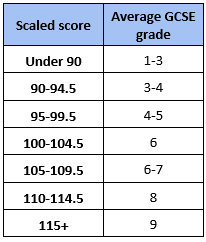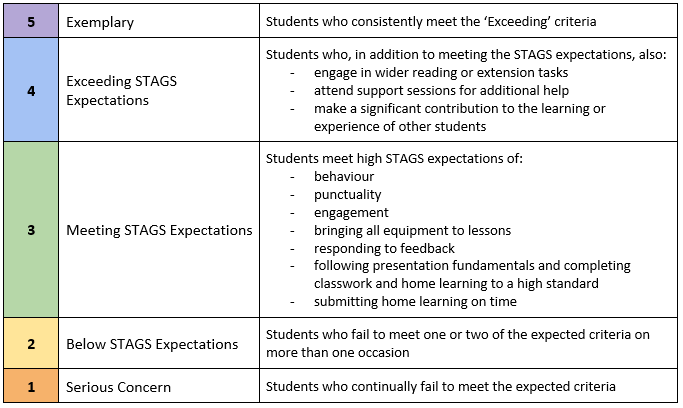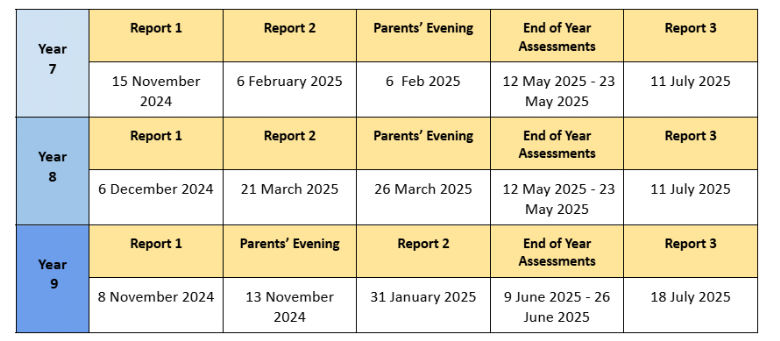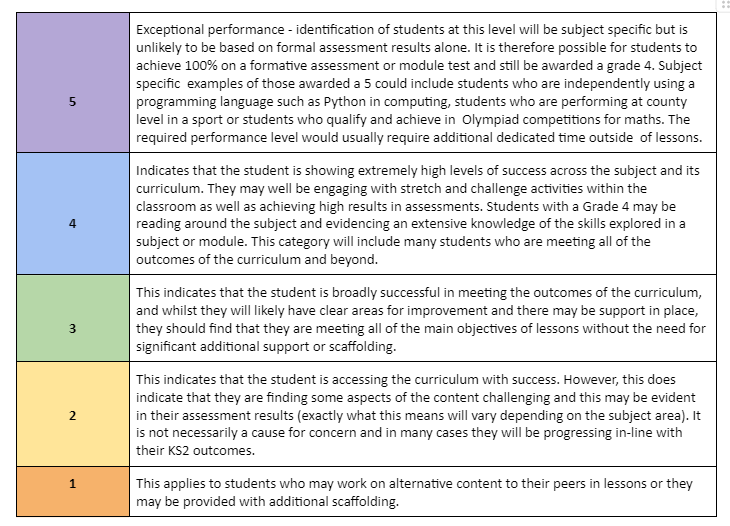Key Stage 3 Information (Years 7,8 & 9)
Curriculum
As outlined in depth on the curriculum page and in our Curriculum Plan which is included below, we have built a curriculum that allows our students in KS3 to thrive and develop a love for learning as well as the foundational knowledge and skills to help them achieve their potential. All students follow the same subject based curriculum.
The core subjects of English, Mathematics and Science are at the heart of the Key Stage 3 curriculum. Separate Biology, Chemistry and Physics modules are taught to enable students to appreciate the distinctive nature of the different sciences. Students are encouraged to appreciate the contributions which all subjects make to a balanced education and the major curriculum areas are all equally valued. Many topics within the areas listed below, are studied in outline to give students the subject appreciation necessary for future course choices, while other topics are studied in depth to ensure academic rigour. Subjects studied at KS3 in addition to the core subjects listed above are:
- Creative subjects studied are Art, Music, Drama and Physical Education.
- In Humanities, students have eparate lessons in History, Geography and Religion, Ethics and Philosophy (REP).
- Students study two Modern Foreign Languages; French and Spanish.
- Design and Technology includes distinct modules in the use of Food, Textiles and Product Design.
- Computing is taught in timetabled lessons in Years 7, 8 and 9.
Students in each year are taught Personal, Social and Health Education (PSHE). This includes delivery of
Relationship and Sex Education, a statutory requirement, as well as Careers , Employability and Enterprise Education.
Assessment and measuring progress
When students move into secondary school, we routinely make use of their KS2 Maths and English levels to determine their starting point from which to measure their progress. Nationally, there is a very strong correlation between this data and how students perform at GCSE, as shown in the table below which shows scaled scores for SATS against average GCSE grades:

To supplement this information from Primary School, CAT4 assessments take place at the start of Year 7. These assessments result in a Standardised Age Score (SAS) for Verbal, Non-Verbal, Numerical and Quantitative reasoning. Nationally, mid-attaining students tend to score between 89 and 111 on each assessment, though we are mindful that there may be exceptions. The CAT4 tests do not rely on prior learning, and therefore they are not assessments for which students can prepare or revise. More information for parents can be found here on the GL Assessment website.
Teachers use this information in their planning, teaching and assessment. When planning lessons, teachers consider learning topics, using the National Curriculum for each subject as a benchmark and by breaking tasks down into different success criteria which are explained to the students. Teachers will use all of the information available to help each student achieve measurable success.
At STAGS, we do not publish target grades for any student at Key Stage 3, as we have found that this can often create a barrier to learning. Targets are published in Year 10 and relate to GCSE outcomes at Key Stage 4.
Assessment and Feedback throughout the year
Each curriculum area determines their assessments based on what works most effectively for them and this can be seen on our subject pages within the curriculum area of this website. Teachers make it explicitly clear how students can achieve well in their subjects and what the nature of any assessments will be; including for the end-of-year assessments in May & June. Details of these will be shared in a timely fashion in a way that is supportive and encouraging.
What your child can expect in addition, is that they will receive feedback in the following ways and these are designed to support your child's development in each subject:
-
There will be one key assessed piece of work where subject-specific feedback is provided, at least once per half-term for all subjects where students are taught for more than one lesson a week
-
Students are expected to respond to this feedback using their Purple Pen of Progress.
-
There will be a regular book check - to maintain high expectations and to provide feedback on the presentation fundamentals.
-
Equally as important are the variety of additional forms of feedback that are deployed during lessons and when responding to home learning including, but not limited to - peer, self, live, verbal, digital and whole class feedback.
Reporting
Parents and carers will receive a report each term (three reports per annum). In Years 7, 8 & 9, students will receive a report including an Attainment and Attitude To Learning (ATL) level for each subject in each report. The only exception to this is the first Year 7 Report which will contain an ATL level only as an indication of how students have started on their STAGS journey.
Students will also receive a Praise and a Progress comment from each subject teacher in each report, as well as an overall Director of Learning comment and a form tutor comment once a year. The dates of these reports and the descriptors of each are included below. The Working At levels are directly linked to our KS3 curriculum. Teachers will regularly assess students against the curriculum as outlined on the individual subject pages, and use the data gained to make a holistic assessment of the students' attainment.
Attainment (Working At) guidance:
In Year 9, to reflect the transition towards KS4 and to support the options process, the descriptors will be linked to broad GCSE outcomes.
The numerical values attached to the ‘Attitude to Learning’ aspects of the report are defined as follows. As per the Working At number for individual subjects, the expectation is that students receive a ‘3’ for ‘Meeting STAGS Expectations’.

Current Comprehension Reading Age
We use the STAR test programme to calculate your child’s current reading comprehension age at regular intervals. Students answer many questions that test their comprehension of selected extracts. It is natural for a student’s current reading age to fluctuate throughout the year depending on performance in the test.
KS3 Reporting Dates 2024-2025

If you have any queries about your child’s progress within a subject, please do not hesitate to contact their Subject Teacher. If your queries are more general i.e. across a number of subjects, please contact your child’s Director of Learning.
Individual curriculum areas will share resources and online materials via the students' google classrooms, but should your child wish to investigate wider, we advocate the use of Seneca Learning, BBC Bitesize - KS3 and The Oak National Academy to support their learning.
